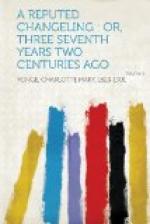The counsel then proceeded to construct a plausible theory. He reminded the jury that at that very time, the summer of 1688, messages and invitations were being despatched to his present Gracious Majesty to redress the wrongs of the Protestant Church, and protect the liberties of the English people. The father of the deceased was a member of a family of the country party, his uncle a distinguished diplomatist, to whose suite he had belonged. What was more obvious than that he should be employed in the correspondence, and that his movements should be dogged by parties connected with the Stewart family? Already there was too much experience of how far even the most estimable and conscientious might be blinded by the sentiment that they dignified by the title of loyalty. The deceased had already been engaged in a struggle with one of the Archfield family, who had been acquitted of his actual slaughter; but considering the strangeness of the hour at which the two cousins were avowedly at or near Portchester, the condition of the clothes, stripped of papers, but not of valuables, and the connection of the principal witness with the pretended Prince of Wales, he could not help thinking that though personal animosity might have added an edge to the weapon, yet that there were deeper reasons, to prompt the assault and the concealment, than had yet been brought to light.
“He will make nothing of that,” whispered Mr. Lee. “Poor Master Peregrine was no more a Whig than old Sir Philip there.”
“’Twill prejudice the jury,” whispered back Mr. Harcourt, “and discredit the lady’s testimony.”
Mr. Cowper concluded by observing that half truths had come to light in the former trial, but whole truths would give a different aspect to the affair, and show the unfortunate deceased to have given offence, not only as a man of gallantry, but as a patriot, and to have fallen a victim to the younger bravoes of the so-called Tory party. To his (the counsel’s) mind, it was plain that the prisoner, who had hoped that his crime was undiscovered and forgotten, had returned to take his share in the rising against Government so happily frustrated. He was certain that the traitor Charnock had been received at his father’s house, and that Mr. Sedley Archfield had used seditious language on several occasions, so that the cause of the prisoner’s return at this juncture was manifest, and only to the working of Providence could it be ascribed that the evidence of the aggravated murder should have at that very period been brought to light.




